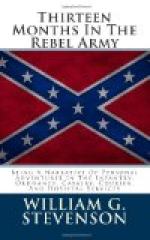The Federals, though fighting well, so far as I know, commenced falling back between two and three P.M. The retreat soon became a rout, and was a running fight to their boats, some three miles. The Confederates pressed them hard, and recaptured several pieces of artillery lost in the early part of the engagement, and did sad execution on the running men; even after they reached the gang-planks of their boats many were shot. I know of no reason why the Union soldiers were routed, unless it was the better fighting of the Rebels. The forces were about equal, and neither had much advantage in ground. General Polk, the commanding general of the Rebels, was not on the ground until near the close of the action, and deserved no credit for the success of his men. General Pillow and Brigadiers Cheatham and McGown, were the efficient commanders that day.
Our wounded, about seven hundred, were carried to the rear during the engagement, and forwarded to Memphis, and we returned and recrossed the river to our camps about seven P.M., completely exhausted. Our company lost, in killed and wounded, twenty-three; the regiment, one hundred and fifteen.
The next day parties were detailed to bury the dead. Ours numbered three hundred. We dug trenches six feet deep and four wide, and laid the bodies in side by side, the members of each company together, the priest saying over them his prayers; the whole closed by three volleys of musketry. The Federal dead were also gathered, and buried in like manner, except the religious services and military salute. Our company buried their dead just before sunset; and when the funeral dirge died away, and the volleys were fired over their graves, many a rugged man, whose heart was steeled by years of hardship and crime, shed tears like a child, for those bound to him by such ties as make all soldiers brothers. One of the worst men in the company excused this seeming weakness to a companion thus: “Tim, I haven’t cried this twenty year; but they were all good boys, and my countrymen.” The next day when the roll was called, and they answered not, we thought of their ghastly faces as we laid them in the trench, and hearts beat quick. When we sat down to eat and missed a messmate, the query went round, “Will it be my turn next?” A comrade’s faults were now forgotten, his good qualities magnified, and all said, “Peace to his ashes.”
I may here say, that if one is compelled to fight against his friends, as I was, there are several ways in which he can avoid taking life. A cartridge without a ball, a pretended discharge without a cap, or an extra elevation of the piece, will save his friends and not expose him to suspicion. Not rarely, also, in the heat of battle, a hated officer meets his fate by a ball from his own men, instead of the enemy.




